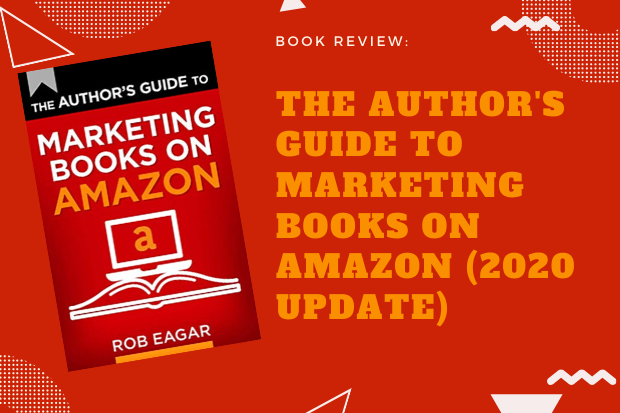Book review: The Author’s Guide to Marketing Books on Amazon
Affiliate Disclosure: This post contains Amazon Associate links, which means if you click on them and make a purchase, I will receive a couple of pennies (at no extra charge to you).
What’s one of the most important things you can do to support your book during the COVID-19 shutdown?
It’s maximizing your book’s presence on Amazon.
That’s why I hosted a free Amazon training webinar last month.
Today, I’m reviewing a book that outlines many steps you can take immediately to support your book on that powerful site — and on other retail sites, as well.
What’s covered in this book?
It’s worth noting that the book I’m reviewing, The Author’s Guide to Marketing Books on Amazon (2020 Update), isn’t new.
It was originally published in 2018 and updated in 2020. While most media outlets prefer to review new or new-ish books, bloggers often have fewer restrictions. In my case, I’m more interested in the book’s topic than its publication date.
View this book as a training program or course in book format.
Author Rob Eagar presumes that you understand why mastering Amazon is important to book sales. Instead of dwelling on that, he provides detailed instruction on all things Amazon, including:
- Writing the best book description possible (and offering a template you can use for yours)
- Understanding the power of your Amazon Author Central Account
- Why and how you need to secure reviews
- How Amazon ads work and how to set them up
Think you know all of this already? Read the book anyway.
Content applies to all publishing models
One of the book’s strengths is that it applies to authors using different publishing models. Anyone from a traditionally published author to one using a hybrid publisher or an individual who has gone the DIY route will benefit from Eagar’s wisdom and experience.
That might be one of the book’s weaknesses, though.
For example, in Chapter 2, “Four ways to Get Amazon Customer Reviews for Free,” Eagar’s first tip is to contact your email subscribers and social media fans to remind them to review your book.
This presumes that you have an engaged list or following that includes many, many people who have purchased your book already. For most self-published authors, this simply isn’t the case. You will be better served by using your list to recruit a launch or street team — which is his second method.
In reality, most authors are going to have to give away copies of their books to their ideal readers to get reviews.
My favorite gems
Here are a few of the specifics I think you might find especially useful.
Chapter 1 not only provides specific instructions on how to write a killer book description, it includes templates for both fiction and nonfiction books.
In addition, the author offers the same advice I’ve provided here and elsewhere: Study how the pros do it.
One of the best gems from that chapter, though, is for novelists: “Don’t tell people about the story. Tell people about the conflict.” That should be a light bulb moment for many.
In Chapter 3, “Maximize Your Amazon Author Central Account,” you will learn how to get your book listed in 10 categories, not the three you’re offered.
I especially like Chapter 4, “Amazon’s Secret Marketing Back Door.” Among other things, it explains how traditionally published authors without access to their book’s account information can go around their publisher to make necessary changes on their book’s detail page. (“Ohhh SNAP!” as the Young People would say.)
You’ll see what I hope is a now-familiar message in Chapter 5, “Understanding the Amazon Best Sellers Rank.” It’s that becoming a category best-seller isn’t the big deal so many think it is. Contorting that category status into marketing copy that touts you as a best-selling author is misleading and perhaps unethical.
But becoming an Amazon best-seller? That is something to cheer about!
I recommend this book
I can’t think of a single author who wouldn’t get a few “ahas!” from The Author’s Guide to Marketing Books on Amazon (2020 Update)
At a minimum, you will use it to review every aspect of your book’s sales page to make sure you’ve done everything he recommends.
You might feel like you want more in-depth guidance on some topics covered, including how to secure endorsements and testimonials (blurbs). Even so, I think that after you’ve read this book from cover to cover, you’ll feel like you’ve just received a gift.
I highly recommend it.
Have you read this book? What did you think about it? Tell us in a comment.
Like what you’re reading? Get it delivered to your inbox every week by subscribing to the free Build Book Buzz newsletter. You’ll also get my free “Top 5 Free Book Promotion Resources” cheat sheet immediately!

